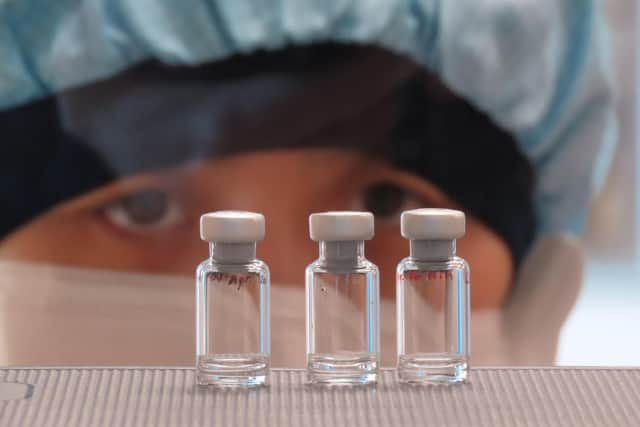Scots team join taskforce racing to develop Covid-19 vaccine
UK ministers announced £14m of new funding for 21 vaccine and treatment research projects, and a task force led by senior medical and scientific advisors to co-ordinate work.
It comes as a team of researchers at the University of Oxford said their trial vaccine could be tested on the first humans as early as next week.
Advertisement
Hide AdAdvertisement
Hide Ad

They claimed to be so confident in its success that one million doses will already have been be produced by September, when the first trial results are set to emerge.
Nicola Sturgeon said yesterday that the “first signs of hope are already there”, as statistics indicate lockdown measures are helping to slow the spread of the virus.
The First Minister said 58 more patients have died after testing positive for coronavirus, bringing the death toll to 837. Confirmed cases were by up 307 to a total of 7,409.
In the latest funding announcement as part of the UK government’s quarter-billion-pound£250m pledge to develop treatments and a vaccine, Professor Aziz Sheikh, director of Edinburgh University’s
Usher Institute, will receive £500,000 to further his work using anonymised health records and test results of 1.2 million Scots to track the spread of Covid-19.
Prof Sheikh’s team will also process blood samples and swabs of the virus taken from a sub-sample ofsome participants, to determine who has been exposed and to sequence the virus genome.
Scottish Secretary Alister Jack said: “The University of Edinburgh will play a vital role in the fight against Covid-19, enabling us to track the spread of the virus in almost real time. Scotland has world-leading universities and I am pleased they are able to use their expertise to help us understand more about this deadly virus.”
The taskforce, led by chief scientific adviser for England Sir Patrick Vallance and deputy chief medical officer for England Professor Jonathan van Tam, will provide industry and research institutions with resources and support, and review regulations to allow quick and safe vaccine trials.
Advertisement
Hide AdAdvertisement
Hide AdIt will also help scale up manufacturing, so that when a vaccine becomes available, it can be produced quickly and in mass quantities.is created it can be produced in large quantities.Representatives from academia and industry such as pharmaceuticals giant AstraZeneca and research body the Wellcome Trust will also form part of the taskforce.
At the daily coronaviruspress briefing at Downing Street, business secretary Alok Sharma said: “UK scientists are working as fast as they can to find a vaccine that fights coronavirus, saving and protecting people’s lives. We stand firmly behind them in their efforts.
“The vaccine taskforce is key to co-ordinating efforts to rapidly accelerate the development and manufacture of a potential new vaccine, so we can make sure it is widely available to patientsas soon as possible.”
Mr Vallance said the task force “will ensure that any potential coronavirus vaccine, when available, can be produced quickly and at scale so it can be made available to the public as quickly as possible”.One project led by the University of Oxford will trial an anti-malarial drug to determine whether it could diminish the effects of Covid-19 on people in high-risk groups.
GP surgeries across the UK have also been invited to take part in the trial to determine whether it could reduce the need for affected patients to go to hospital and speed up their recovery.Another project is Public Health England’s study on how Covid-19 can be transmitted from person to person by determining how long it can survive in the air and on differentmaterials found in hospitals.
Meanwhile, researchers at Oxford University said UK volunteers could be given the first dose of a potential coronavirus vaccine within the next week.
Sarah Gilbert, a professor of vaccinology who is leading the team, said a vaccine could be available for use by the general public by the autumn.Prof Gilbert said she had a “high degree of confidence” in the vaccine’s success.
“This is my view, because I’ve worked with this technology a lot, and I’ve worked on the Mers [Middle East Respiratory Syndrome] vaccine trials, and I’ve seen what that can do. And I think it has a very strong chance of working.”
Advertisement
Hide AdAdvertisement
Hide AdResearchers added that, as well as developing a vaccine that can be used on a mass scale, it is important to make sure it can be manufactured at the required pace.
Professor Adrian Hill, director of the Jenner Institute at Oxford, said the team probably has the “most ambitious scale-up” programme of all the groups working on a vaccine.
He said: “The aim is to have at least a million doses by around about September, once you know the vaccine efficacy results. And then move even faster from there because it’s pretty clear the world is going to need hundreds of millions of doses, ideally by the end of this year to end this pandemic, to let us out of lockdown.”
“A vaccine is the exit strategy for this pandemic and then we’re very likely to need a vaccine in future years because it’s unlikely we’ll be able to eradicate this virus.”
A message from the Editor:Thank you for reading this story on our website. While I have your attention, I also have an important request to make of you.With the coronavirus lockdown having a major impact on many of our advertisers - and consequently the revenue we receive - we are more reliant than ever on you taking out a digital subscription.Subscribe to scotsman.com and enjoy unlimited access to Scottish news and information online and on our app. With a digital subscription, you can read more than 5 articles, see fewer ads, enjoy faster load times, and get access to exclusive newsletters and content. Visit https://www.scotsman.com/subscriptions now to sign up.
Our journalism costs money and we rely on advertising, print and digital revenues to help to support them. By supporting us, we are able to support you in providing trusted, fact-checked content for this website.
Frank O'Donnell
Editorial Director
Comments
Want to join the conversation? Please or to comment on this article.
